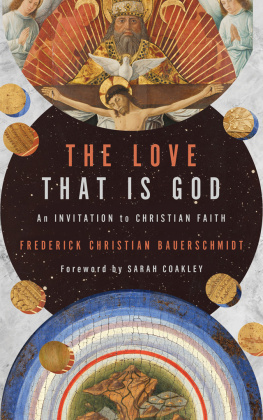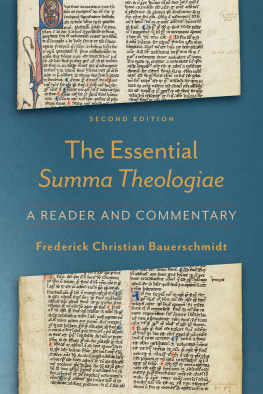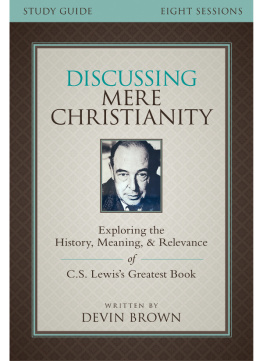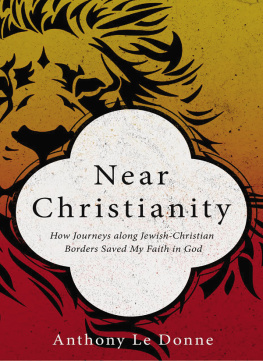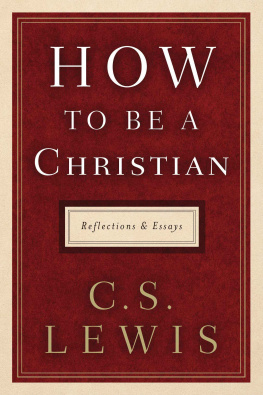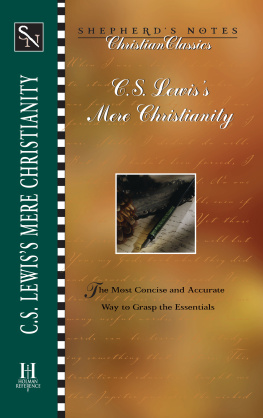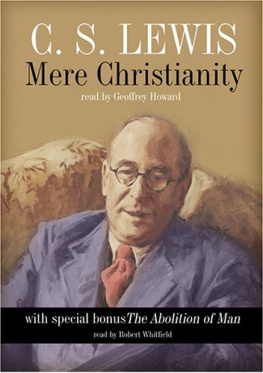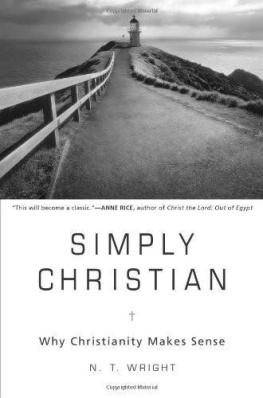Lovehe has to be kiddingbut Bauerschmidt is not kidding. He has written an extraordinary account of love to help us understand better what we are doing when we say we believe in God. In doing so he has avoided the great enemies of any attempt to write about lovethat is, sentimentality and rationalism. His chapter on friendship alone is worth the price of the book. I cannot help but believe that this book is destined to become a classic.
Stanley Hauerwas
Duke Divinity School
I make it a point to read at least one introduction to Christianity book each year, to remind myself of what it is I believe (or want to believe). This one is as beautiful and beguiling an example of the genre as I have seen. It is humble, not assuming it has a right to your attention but seeking instead to invite your curiosity. It is generous and ecumenical, yielding space to voices like those of St. Catherine of Siena, Dorothy Day, and Dr. King. In our day of shrill and overheated religious grandstanding, its quiet witness to the God of cruciform love made me want to become a Christian all over again.
Wesley Hill
Trinity School for Ministry
In his compelling and well-written book, Bauerschmidt seeks to revitalize the affirmation that God is love itself. His argument will resonate especially with those who struggle to see how Christianity matters in this postmodern world. He shows how this love is actualized in the death and resurrection of Jesus, a love shared by the friends of Jesus who gather in Spirit-created communities of care and service. Bauerschmidts is a persuasive apologetic for the power and practicality of the core Christian message.
Richard Peace
Fuller Theological Seminary
Edifying, uplifting, instructivethese are the words that came to mind reading The Love That Is God. Frederick Bauerschmidts book is a spiritual and theological meditation on the radical claim that God is lovepresented through the stories and images of the Scriptures and the wisdom of the churchs beloved teachers: Augustine, Catherine of Siena, Julian of Norwich, John Chrysostom, Richard of St. Victor, Thomas Aquinas, Thrse of Lisieux, Dorothy Day.
Robert Louis Wilken
University of Virginia
Drawing upon a rich variety of sources from Scripture and tradition, Bauerschmidt has written an exquisite meditation on five essential elements of the Christian faith. It combines erudition with a beautiful simplicity of expression, which will make its insights accessible and illuminating in many educational contexts: college, university, and seminary instruction, pastoral ministry, and catechetics. This little book would also make a lovely gift of inspired spiritual reading for any Christian to savor again and again.
Kelley Spoerl
Saint Anselm College
What is love, and how does it work? The opening words of this relevant books introduction provide a key to how to be a Christian in our times: Being a Christian is difficult... difficult because love that goes all the way to the cross is difficult. Bauerschmidt describes obstacles to loving and to being a Christian in our current culture and churches. Read slowly and seriously, this book can change our personal lives, renew our churches, and hopefully have a profound effect on our digital and oppressive culture. This book could help heal our painful polarizations. Heartfelt love (from and for God, ourselves, and others) is what we can believe, and how we are to live. Bauerschmidt makes this exceptionally clear and comprehensible for all.
Dean Borgman
Gordon-Conwell Theological Seminary
The Love That Is God
An Invitation to Christian Faith
Frederick Christian Bauerschmidt
WILLIAM B. EERDMANS PUBLISHING COMPANY
GRAND RAPIDS, MICHIGAN
Wm. B. Eerdmans Publishing Co.
4035 Park East Court SE, Grand Rapids, Michigan 49546
www.eerdmans.com
2020 Frederick Christian Bauerschmidt
All rights reserved
Published 2020
262524232221201234567
ISBN 978-0-8028-7795-6
eISBN 978-1-4674-5925-9
Library of Congress Cataloging-in-Publication Data
Names: Bauerschmidt, Frederick Christian, author.
Title: The love that is God : an invitation to Christian faith / Frederick Christian Bauerschmidt.
Description: Grand Rapids, Michigan : William B. Eerdmans Publishing Company, 2020. | Includes bibliographical references. | Summary: A brief introduction to Christianity in five statements of beliefProvided by publisher.
Identifiers: LCCN 2020003719 | ISBN 9780802877956 (paperback)
Subjects: LCSH: God (Christianity)Love. | LoveReligious aspectsChristianity. | Christian life.
Classification: LCC BT140 .B385 2020 | DDC 231/.6dc23
LC record available at https://lccn.loc.gov/2020003719
Unless noted otherwise, Scripture quotations are from New Revised Standard Version Bible, copyright 1989 National Council of the Churches of Christ in the United States of America. Used by permission. All rights reserved worldwide. https://nrsvbible.org
For Thomas, Sophie, and Denis
God on the Crossis the fearful hidden meaning behind this symbol still understood?
FRIEDRICH NIETZSCHE,
The Anti-Christ, 51
Contents
This is a book that you should read, regardless of whether you are a professed Christian, a seeker, or a skeptic. Let me explain why.
There was a time at the turn of the twentieth century when European theologians were particularly concerned about what constituted the essence of Christianity. In part, this urgency was spurred by the increasingly felt pressure on the Christian churches at that time of the truth claims of the so-called other world religions, now increasingly seen as rivals to Christianitys absoluteness; and it was doubtless not a coincidence that this moment also signaled (as we can see in retrospect) the beginning of a loss of colonial confidence about the missionizing of all political subjects to the Christian faith. Yet in 1900 the great liberal German historical theologian Adolf von Harnack gave his famous lectures entitled Das Wesen des Christentums (What Is Christianity?), delivered extempore to a huge audience in Berlin; and when translated into myriad languages, copies of the text were saidby Paul Tillich in lectures to a later generation of studentsto have blocked up the shunting yards of German railways, so busy were they transporting them all over the world.
But if essentializing the faith had inevitably begun to be seen as a rearguard action in the face of postmodernitys erosions of stability, it did not mean that the task of giving a limpid, alluring personal account of the hope that is in one (1 Pet. 3:15) had any less spiritual importance.
So when we are drawn into a little book as elegant and powerful as Bauerschmidts The Love That Is God, we see that he has revivified, and indeed transformed, a genre of writing of which many have despaired. And even then, Bauerschmidts achievement and style are entirely his own. Resisting (but never mentioning) the tired disjunction between liberal and conservative Christianity, Bauerschmidt sets out to give his own fresh account of what really matters in the Bible and Christian tradition, and how it changes everything for those willing to respond to the call and demand of the love that is God.
Why is Bauerschmidts achievement so striking? A number of distinctive features should be mentioned.
First, it is important to read this book backwards (so to speak), because the remarkable sermon that originally inspired its fuller exposition is found at the end of the book, in lilting, indeed haunting,

